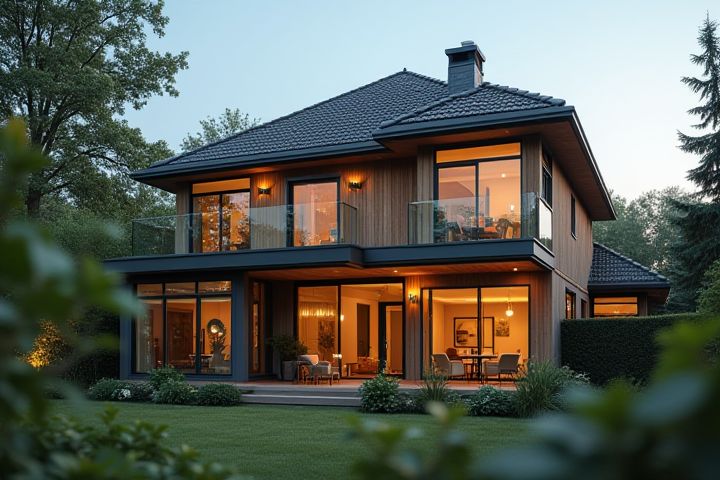
A smart house can significantly enhance energy efficiency through its automated systems and intelligent devices. By utilizing smart thermostats, you can optimize heating and cooling schedules based on your daily routine, which reduces unnecessary energy consumption. Smart lighting systems enable you to control lights remotely and set timers, ensuring that lights are only on when needed. Energy monitoring tools in a smart home allow you to track and analyze usage patterns, promoting more informed decisions for conserving energy. Moreover, integrating renewable energy sources, like solar panels, with smart home technology can further decrease reliance on grid power, leading to substantial savings on your energy bills.
Does A Smart House Save Energy
Automated energy management
Automated energy management systems in a smart house efficiently optimize energy usage by utilizing smart sensors and smart appliances that communicate to adjust consumption based on real-time needs. These systems can schedule devices like thermostats, lights, and water heaters to operate during off-peak hours, reducing energy costs and strain on the grid. By monitoring your energy consumption patterns and providing insights, these technologies enable you to make informed decisions about usage, leading to significant energy savings. Integrating renewable energy sources, such as solar panels, with automated management systems further enhances overall sustainability and efficiency.
Smart thermostats
Smart thermostats play a crucial role in energy conservation within a smart house by optimizing heating and cooling schedules based on your lifestyle patterns. These devices utilize advanced algorithms and machine learning to automatically adjust temperatures when you're home or away, significantly reducing unnecessary energy consumption. Moreover, smart thermostats can provide real-time energy usage reports, enabling you to make informed decisions to further enhance efficiency. With features like remote control via smartphone apps, you can ensure your home maintains an ideal climate while minimizing energy waste.
Efficient lighting systems
Efficient lighting systems in a smart house significantly reduce energy consumption by utilizing LED technology and intelligent controls. These systems can automatically adjust brightness based on natural light levels and occupancy, ensuring energy is only used when necessary. Features like programmable schedules and remote access allow you to control your lighting efficiently, even when you're away from home. By optimizing light usage, smart homes contribute to lower utility bills and a reduced carbon footprint, aligning with sustainable living practices.
Energy consumption monitoring
Energy consumption monitoring in a smart house can significantly enhance energy efficiency, reducing your utility bills by up to 30%. Smart devices, equipped with sensors, track real-time energy usage, allowing you to identify patterns and areas for improvement. The average household wastes approximately 10% of energy due to inefficient appliances; addressing this through monitoring can lead to substantial savings. By integrating smart thermostats and lighting systems, you can optimize energy consumption, ensuring resources are used judiciously and sustainably.
Appliance control
Smart houses utilize advanced appliance control systems to optimize energy consumption effectively. With features like remote monitoring and automation, you can schedule appliances to operate during off-peak hours, reducing energy bills. Smart thermostats learn your habits, adjusting heating and cooling systems based on real-time data, ensuring comfort while conserving energy. By integrating energy-efficient appliances and IoT technology, your smart home maximizes efficiency and minimizes environmental impact.
Smart window treatments
Smart window treatments are an effective way to save energy in a smart house by optimizing natural light and temperature control. These automated blinds or shades adjust based on sunlight intensity, helping to reduce heat gain in the summer and maximize warmth during winter months, thus lowering heating and cooling costs. Equipped with sensors and timers, smart window treatments can also respond to your daily routines, providing enhanced comfort while conserving energy. By investing in this technology, you contribute to a more sustainable home environment while enjoying improved energy efficiency.
HVAC system optimization
A smart house enhances energy efficiency by optimizing HVAC systems, utilizing advanced algorithms and real-time data to maintain ideal temperatures. By analyzing occupancy patterns and weather forecasts, these systems adjust heating and cooling dynamically, reducing energy waste. Smart thermostats, coupled with sensors, detect your presence and modify settings accordingly, ensuring comfort while minimizing energy consumption. This intelligent management can lead to significant savings on utility bills, making your home both eco-friendly and cost-effective.
Renewable energy integration
A smart house significantly enhances energy efficiency by integrating renewable energy sources, such as solar panels and wind turbines, into its design. By utilizing smart meters and energy management systems, you can optimize energy consumption patterns, ensuring that renewable energy is harnessed effectively. This intelligent management reduces reliance on fossil fuels and lowers energy costs, while also minimizing your carbon footprint. Moreover, real-time monitoring allows for quick adjustments, ensuring maximum efficiency in harnessing available renewable energy.
Demand response capabilities
A smart house equipped with demand response capabilities significantly enhances energy efficiency by adjusting energy consumption in real-time based on grid conditions and energy prices. These systems communicate directly with your utility provider, allowing for automatic adjustments during peak demand times, which can lower your energy bill. By using smart appliances, thermostats, and lighting systems, energy usage can be optimized, leading to reduced overall consumption. Embracing such technology not only saves you money but also contributes to a more sustainable energy system.
Energy-saving mode settings
Energy-saving mode settings in smart homes can significantly reduce overall energy consumption, often by up to 30%. Devices like smart thermostats intelligently adjust heating and cooling based on your habits, ensuring that energy is not wasted when you're away. Smart lighting systems can automatically dim or turn off lights in unoccupied rooms, further optimizing energy usage. By utilizing these features, you can enhance your home's efficiency while lowering utility bills and reducing your carbon footprint.
